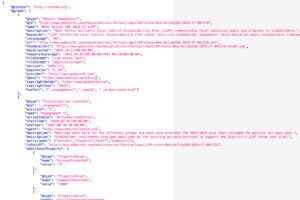The untapped potential of the LCAP:
- Local Control Accountability Plans (LCAPs) contain important insights, but they are often buried in weighty documents
- Big data, which can be put to work in support of our schools and our children, is locked up in LCAP documents
- GOBO can make LCAP production easier and provide actionable insights to districts and stakeholders through its structured data approach
- Take the work out of the LCAP and make it work for you

In 2013, California passed innovative education accountability measures designed to empower school districts and fuel their progress through targeted, goal-based funding. And yet the Local Control Accountability Plan (LCAP) hasn’t been without its critics, including those who site a lack of transparency as well as challenges with determining whether or not districts are really delivering desired results.
Gobo is committed to helping districts and their stakeholders build better schools and deliver better results, which we do by creating tools that help develop and share continuously improving LCAPs so that districts can set, measure, and achieve targets that deliver real change. We believe that every LCAP is rich with important insights, but know they can be tough to mine from a dense text document. The unwieldy LCAP has frustrated critics and hindered LCAP usefulness, adoption and success.
Big data, which is the ability to mine insights from large amounts of structured data, has been making its mark in all sectors and industries. From environmental change, to consumer behavior, to world health trends, structured data is changing the way we see and shape our world.
The LCAP and the critical need for structured data
It’s time to put structured data to work in support of our schools and our children. Many LCAPS exceed 100 pages in length. A structured data version, like those used in many other industries which are based on international standards, would help districts and stakeholders zero in on the most important insights each LCAP contains, and more importantly would facilitate longer term benefits, like easy progress tracking, alignment to other plans and agencies, multi-district or state wide comparisons, and gap analysis. Locked-up LCAP data impedes California’s education progress and contributes to the perceived flaws of the approach which we believe can be in large part remedied through an enhanced design.
At Gobo, we have a unique perspective on the LCAP challenges, having already worked with over 60 school districts and County Offices of Education (COEs) across the State to provide a significant stakeholder communication tool (the original LCAP Infographic). Our work has required us to immerse ourselves into the LCAPs in order to derive the key insights that are the foundation of the infographics we produce. Because we have consumed and distilled over 100 plans across the state, we have a unique depth of understanding of these documents. This detailed level of familiarity with LCAPs has led to an overriding conclusion:
There is a wealth of critical data and insight locked up in these text documents that is difficult to mine and can easily be lost or forgotten in the day to day demands of educating our children and serving our stakeholders.
Leveraging our data visualization and analytics expertise, we have devised a solution to this locked up data challenge by building upon the open source work led by technology heavyweights Google, Microsoft and Yahoo. The result is a structured data format for the LCAP which will make it easier to create, update, track, measure and share – all of which are key to bringing the intended benefits to life.
How would the LCAP be converted to structured data?
Data visionaries, such as the companies mentioned previously, have already discovered that a methodical and structured approach to parsing text (data) is key to unlocking insights that can only be found when disparate data sources can be parsed, merged, analyzed and compared. The approach itself is to create a structured data vocabulary for a given industry, such as Education. The structured data vocabulary defines simple “name/value” pairs that is essentially an agreed upon, field-by-field naming convention. Once there is agreement on how things will be named, relationships to other fields can be defined, further enhancing the ability to mine the data to draw insights and discovery. With structured data, all data elements have clear meaning and specific relationships and can therefore be easily interpreted with computers. (Fun fact: structured data is key to the ‘artificial intelligence’ leveraged by IBM’s Watson to win a Jeopardy match.)
Gobo has applied an existing universal standard, called the JSON-LD markup format, to create a prototype data set for California’s LCAP. This free, open source structure can be applied to more education-related data in the future, creating more and more ability to see connections, dependencies, gaps and results. But for now, just the ability to make each LCAP easier to produce, interpret, compare and update would be a great start.
For the data geek in everyone
 So let’s start right here: a sample LCAP in a Structured Data .JSON-LD markup format (or .PDF format). When you look at the text document, you begin to recognize the explicit name (or definition) / value pairs, such as:
So let’s start right here: a sample LCAP in a Structured Data .JSON-LD markup format (or .PDF format). When you look at the text document, you begin to recognize the explicit name (or definition) / value pairs, such as:
“name”: “SurveysConducted”,
“value”: “3”,
Add in some specific formatting that allows computers to easily interpret the Structured Data pairs, and we can then unlock the data and its accompanying insights. Organizations can then easily and universally publish (and archive!) this data within an organization, amongst your stakeholders, and beyond.
By parsing the LCAP data in a standard way, all ~2,245 LCAPS generated within California can be quickly consumed by computers to be analyzed, improved, and communicated in a myriad of ways. As the use of structured data in education grows, it can all be brought together for insights which lead to action plans, change, and ultimately better educated students.
So what’s next?
Gobo is incorporating structured data into the internal and external tools we provide to continue to enhance the value of our services in support of Education. We are underway with a proof of concept to illustrate how structured data can be applied at the County level to provide insights that would be otherwise unavailable. Perhaps most importantly, we are leading an effort to establish a Structured Data for Education Working Group (SDEWG) to jointly establish a robust Education data set to be adopted by the preeminent industry standards board, Schema.org. You are welcome to contact us to discuss this work or any of our innovations to explore how we might be able to help you make the best use of the LCAP process and in particular to join forces.

